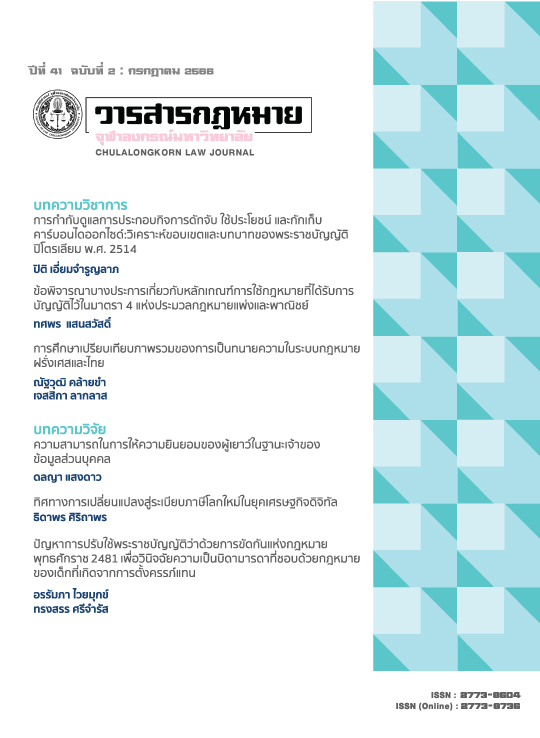การศึกษาเปรียบเทียบภาพรวมของการเป็นทนายความในระบบกฎหมายฝรั่งเศสและไทย
Main Article Content
บทคัดย่อ
ในทุกประเทศ ผู้ที่ประสงค์ที่จะประกอบวิชาชีพทนายความต้องมีคุณสมบัติทั้งด้านปริญญาบัตรทาง การศึกษา ประวัติการศึกษา สัญชาติ การอบรมทางจริยธรรม การฝึกปฏิบัติ และคุณสมบัติอื่น ๆ เหล่านี้เป็นเงื่อนไขของผู้ที่ประสงค์ที่จะเป็นผู้ประกอบวิชาชีพทนายความซึ่งมีความเหมือนและความแตกต่างกัน ทั้งนี้ขึ้นอยู่กับกฎหมายและข้อบังคับของแต่ละประเทศ
บทความนี้มีวัตถุประสงค์ที่จะทำการวิเคราะห์และเปรียบเทียบการเป็นทนายความระหว่างประเทศฝรั่งเศสและประเทศไทยเพื่อนำไปสู่การให้ข้อเสนอในการพัฒนาความเป็นทนายความในประเทศไทยที่กำลังเป็นประเด็นถกเถียงกันในสังคมในปัจจุบัน
บทความนี้กระทำโดยวิธีการศึกษาเอกสารปฐมภูมิทางกฎหมาย ได้แก่ พระราชบัญญัติ และกฎหมายลำดับรองที่เกี่ยวข้องของทั้งสองประเทศ รวมถึงเอกสารทุติยภูมิทางกฎหมาย ได้แก่ หนังสือและตำราทางนิติศาสตร์และรายงานของหน่วยงานราชการ รวมถึงการสัมภาษณ์ทนายความ เพื่อวิเคราะห์และให้ข้อเสนอแนะเกี่ยวกับการปรับปรุงกฎหมายหรือระเบียบที่เกี่ยวข้องกับการสอบทนายความในประเทศไทย
ผลการศึกษาพบว่า การเป็นทนายความของประเทศฝรั่งเศสมีความคล้ายคลึงกับระบบกฎหมายไทยในหลายประเด็น อย่างไรก็ตาม พบว่ามีความแตกต่างสำคัญระหว่างสองระบบเช่นกัน ขณะนี้ กระบวนการของการสอบเป็นทนายความในประเทศไทยกำลังเป็นประเด็นสำคัญในสังคม ซึ่งมีนักนิติศาสตร์หลายภาคส่วนกำลังเรียกร้องให้มีการปฏิรูป บทความนี้จึงอาจเป็นประโยชน์ต่อการปฏิรูปกระบวนการสอบทนายความของประเทศไทยที่กำลังเป็นที่ถกเถียงกันในขณะนี้
Article Details

อนุญาตภายใต้เงื่อนไข Creative Commons Attribution-NonCommercial-NoDerivatives 4.0 International License.
ลิขสิทธิ์และเนื้อหาในเว็บไซต์ของวารสารกฎหมาย (รวมถึง โดยไม่จำกัดเฉพาะ เนื้อหา รหัสคอมพิวเตอร์ งานศิลป์ ภาพถ่าย รูปภาพ ดนตรีกรรม โสตทัศนวัสดุ) เป็นกรรมสิทธิ์ของวารสารกฎหมาย และผู้ได้รับการโอนสิทธิทุกราย
1. วารสารกฎหมาย ให้อนุญาตให้คุณใช้สิทธิอันไม่เฉพาะเจาะจงที่สามารถถูกถอนเมื่อใดก็ได้ โดยไม่มีค่าใช้จ่าย ในการ
- เยี่ยมชมเว็บไซต์และเอกสารในเว็บไซต์นี้ จากคอมพิวเตอร์หรือเครื่องมือสื่อสารผ่านเว็บบราวเซอร์
- คัดลอกและจัดเก็บเว็บไซต์และเอกสารในเว็บไซต์นี้บนลงคอมพิวเตอร์ของคุณผ่านระบบความจำ cache
- สั่งพิมพ์เอกสารจากเว็บไซต์นี้สำหรับการใช้ส่วนตัวของคุณ
- ผลงานที่ได้รับการตีพิมพ์โดยวารสารกฎหมาย จุฬาลงกรณ์มหาวิทยาลัย ถูกคุ้มครองภายใต้ Creative Commons Attribution 4.0 International License ซึ่งอนุญาตให้ทุกคนสามารถคัดลอก แจกจ่าย ดัดแปลง ส่งต่อ ผลงานได้ ก็ต่อเมื่อผลงานและแหล่งข้อมูลได้รับการอ้างอิงอย่างเหมาะสม
2. วารสารกฎหมาย จุฬาลงกรณ์มหาวิทยาลัย สงวนสิทธิ์ไม่อนุญาตให้คุณใช้สิทธิอื่นใดที่เกี่ยวข้องกับเว็บไซต์และเอกสารบนเว็บไซต์นี้ เช่น การคัดลอก ดัดแปลง เปลี่ยนแปลง ส่งต่อ ตีพิมพ์ แจกจ่าย เผยแพร่ จัดแสดงในที่สาธารณะ ไม่ว่าจะในรูปแบบใดก็ตาม ซึ่งเว็บไซต์หรือเอกสารบนเว็บไซต์ โดยไม่อ้างอิงถึงแหล่งข้อมูลหรือโดยไม่ได้รับอนุญาตเป็นลายลักษณ์อักษรจากวารสารกฎหมาย จุฬาลงกรณ์มหาวิทยาลัย
3. คุณอาจขออนุญาตที่จะใช้เอกสารอันมีลิขสิทธิ์บนเว็บไซต์นี้โดยการเขียนอีเมลล์มายัง journal@law.chula.ac.th
4. วารสารกฎหมาย จุฬาลงกรณ์มหาวิทยาลัย เข้มงวดกับการคุ้มครองลิขสิทธิ์อย่างมาก หากวารสารกฎหมาย จุฬาลงกรณ์มหาวิทยาลัยพบว่าคุณได้ใช้เอกสารอันมีลิขสิทธิ์บนเว็บไซต์นี้โดยไม่ถูกต้องตามการอนุญาตให้ใช้สิทธิ ดังที่กล่าวไปข้างต้น วารสารกฎหมาย จุฬาลงกรณ์มหาวิทยาลัยอาจดำเนินคดีตามกฎหมายต่อคุณได้ เพื่อเรียกร้องค่าเสียหายที่เป็นตัวเงินและคำขอชั่วคราวให้คุณหยุดการใช้เอกสารดังกล่าว ทั้งนี้ คุณอาจถูกสั่งให้ชดใช้ค่าใช้จ่ายใดๆ ที่เกี่ยวข้องกับการดำเนินการตามกฎหมายนี้
หากคุณพบเห็นการใช้เอกสารอันมีลิขสิทธิ์ของวารสารกฎหมาย จุฬาลงกรณ์มหาวิทยาลัย ที่ขัดหรืออาจขัดต่อการอนุญาตให้ใช้สิทธิดังที่ได้กล่าวไปข้างต้น โดยเชื่อว่าได้ละเมิดลิขสิทธิ์ของคุณหรือของผู้อื่น สามารถร้องเรียนมาได้ที่ journal@law.chula.ac.th
เอกสารอ้างอิง
Announcement of the Law Practice Training Center of the Lawyers Councils on Academic Examination of the applicant of the Law Practice Training Center Generation 58th, dated 12 April 2022.
Announcement of the Law Practice Training Center of the Lawyers Councils on Practical Examination of the applicant of the Law Practice Training Center Generation 57th, dated 22 August 2022.
Arrêté du 9 mai 2022, modifiant l'arrêté du 7 décembre, 2005 fixant le programme et les modalités de l'examen d'aptitude à la profession d'avocat. [online] Available from : https://www.legifrance.gouv.fr/jorf/id/JORFTEXT000045780414 [1 August 2022]
Article 101 3o de la loi no 71-1130 du 31 décembre 1971
Article 11 1o de la loi no 71-1130 du 31 décembre 1971
Article 11 4o de la loi no 71-1130 du 31 décembre 1971
Article 11 5o de la loi no 71-1130 du 31 décembre 1971
Article 52 du décret no 91-1197 du 27 novembre 1991 organisant la profession d’avocat et Article 11 de la loi no 71-1130 du 31 décembre 1971
Article 58 du décret no 91-1197 du 27 novembre 1991 organisant la profession d’avocat
Avocats Barreau de Paris. Du Moyen-Âge à nos jours, découvrez l’histoire de notre barreau. [online] Available from : https://www.avocatparis.org/qui-sommes-nous/un-peu-dhistoire#:~:text=Du%20Moyen%2DAge%20%C3%A0%20la [9 September 2022]
Charnchai Sawangsagdi. France’s Influence in the Thai Legal Reform. 2nd ed. Bangkok: Winyuchon Publication House, 2015.
Clause 13 of Rules of the Lawyers Council of Thailand regarding the Law Practice Training Center B.E. 2529 (A.D. 1986)
Clause 17 of Thai Bar Regulation B.E. 2507 (A.D. 1964)
Conseil National des Barreaux, Toutes les conditions d’accès à la profession. [online] Available from : https://www.cnb.avocat.fr/fr/toutes-les-conditions-dacces-la-profession#:~:text=La%20profession%20d'avocat%20est%20en%20principe%20r%C3%A9serv%C3%A9e%20aux%20titulaires,d'avocats%20(CRFPA) [1 August 2022]
Décret n°2004-1386 du 21 décembre, 2004 relatif à la formation professionnelle des avocats (Decree n°2004-1386 of 21 December 2004 on the professional training of lawyers). [online] Available from : https://www.legifrance.gouv.fr/loda/id/JORFTEXT000000805388/ [1 August 2022]
Directive 98/5/EC of the European Parliament and of the Council of 16 February 1998 to facilitate practice of the profession of lawyer on a permanent basis in a Member State other than that in which the qualification was obtained. [online] Available from : https://eur-lex.europa.eu/legal-content/FR/ALL/?uri=celex%3A31998L0005 [1 August 2022]
Directory of French bar’s schools. [online] Available from : https://www.cnb.avocat.fr/fr/annuaire-ecoles [1 August 2022]
E. W. Timberlake Jr. Origin and Development of Advocacy as a Profession. Virginia Law Review 9, 1 (November 1922): 25.
G. Sharswood. An Essay on Professional Ethics. Philadelphia: T. & J. W. Johnson & co., 1860.
Information and Public Relations Division, Court of Justice, 7th August Rapee Day Podcast. [online] Available from : https://iprd.coj.go.th/th/content/category/detail/id/10/cid/10720/iid/205879 [1 August 2022]
La décision à caractère normatif n° 2005-003 portant adoption du règlement intérieur national (RIN) de la profession d’avocat. [online] Available from : https://www.cnb.avocat.fr/fr/reglement-interieur-national-de-la-profession-davocat-rin [1 August 2022]
Law Practice Training Center of the Lawyers Councils. Lawyers’ Ethics and Manners. Bangkok: Borpit Printing Co., LTD, 2001.
Le Décret n°2005-790 du 12 juillet. 2005 relatif aux règles de déontologie de la profession d’avocat. [online] Available from : https://www.legifrance.gouv.fr/loda/id/JORFTEXT000000633327/2022-07-24/ [1 August 2022]
Le Décret n°91-1197 du 27 novembre. 1991 Organisant la profession d’avocat. [online] Available from : https://www.legifrance.gouv.fr/loda/id/JORFTEXT000000356568/ [1 August 2022]
Loi n° 71-1130 du 31 décembre 1971. Portant réforme de certaines professions judiciaires et juridiques. [online] Available from : https://www.legifrance.gouv.fr/loda/id/LEGITEXT000006068396/ [1 August 2022]
Matichon Online. Lawyers Council protests the proposition of the National Council of Legal Education for authorizing the barristers to proceed with the lawsuit without training. [online] Available from : https://www.matichon.co.th/politics/news_3186067 [1 August 2022]
Munin Phongsapan. Reform of the legal education in Thailand, Change ‘Deaf lawyer’ into ‘People’s rights protectors. [online] Available from : https://www.the101.world/legal-education-reform/ [1 August 2022]
Nikon Thatsaro. Prince Rapee Pattanasak the Father of Thai Law. 1st ed. Bangkok: Nanmeebook, 2006.
Sawaeng Boonchalermvipas. The Thai Legal History. 19th ed.Bangkok: Winyuchon Publication House, 2020.
Section 258 c. (2) of Constitution of the Kingdom of Thailand
Section 3 of Lawyer Act B.E. 2457 (A.D. 1914)
Section 35 of Lawyer Act B.E. 2528 (1985)
Section 35 of Lawyer Act B.E. 2528 (A.D. 1985)
Section 37 of Lawyer Act B.E. 2528 (A.D. 1985)
Section 38 of Lawyer Act B.E. 2528
Section 4 of Lawyer Act B.E. 2508 (A.D. 1965)
Section 7 of the Act on Judicial Administration of the Courts of Justice R.E. 111 (A.D. 1892).
Sutthichai Ngamchuensuwan. Preliminary recommendation for reforming national legal educations. [online] Available from : https://www.the101.world/legal-education-reform-recommendation/ [1 August 2022]
Thairath. Lawyers Council protests the fact that the Committee of the National Council of Legal Education would have the power to authorize lawyers. [online] Available from : https://www.thairath.co.th/news/local/2317965 [1 August 2022]
the Law Practice Training Center of the Lawyers Councils. Lawyers’ Ethics and Manners. Bangkok: Borpit Printing Co., LTD, 2001.
the Ministry of Justice. the law of organisation of the court of justice and the law of civil procedure of the year 127. 2nd ed. ฺBangkok: Bamrung Nukunkit Print Shop, 1908.
The Sub-Committee of the National Council of Legal Education. Guideline of the National Council of Legal Education (public version). [online] Available from : http://law.tu.ac.th/news-11-feb-2022/ [1 August 2022]


